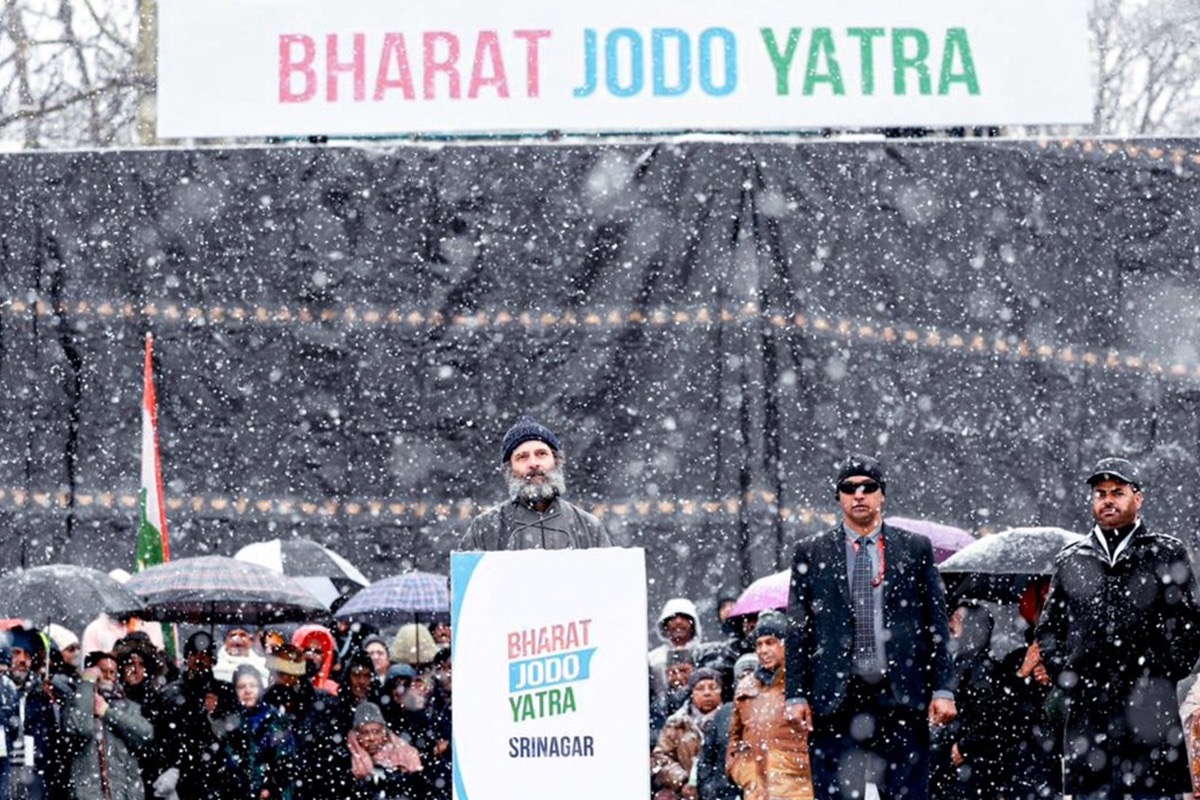The Bharat Jodo Yatra led by the Congress leader Rahul Gandhi came to an end with Gandhi hoisting the national flag at Srinagar’s Lal Chowk on Sunday. It was a momentous occasion because the ceremony to hoist the Tricolor by political parties at Lal Chowk, Srinagar was suspended when Pakistan sponsored terrorism erupted in Kashmir in 1989. For 30 years, till 2019, terrorists hoisted Pakistani, Islamic and black flags at the famous tower in the summer capital of the valley. The political tradition of hoisting the tricolor was resumed only a few years ago after the Modi government nullified Article 370 and reorganized the state in 2019.
It is important to understand the efforts that enabled the Gandhi siblings—Rahul and Priyanka—to do what was unthinkable for three decades in Kashmir.
A few months before the removal of 370, the Modi government banned Jammu & Kashmir Liberation Front (JKLF), a terror group and Jamaat-e-Islami, a radical Islamist group, which built a wide network of cadre and supporters in Kashmir in the last 40 years. The members of these groups raised funds in the country and from abroad through various illegal channels, including hawala, for funding separatist and terrorist activities in Jammu and Kashmir. The funds collected were used for radicalising youth, pushing them into jihadist terror and causing disruption in the Kashmir Valley by way of pelting stones on security forces, systematically burning schools, damaging public property, and waging war against India.
Jamaat-e-Islami’s terrorist wing, Hizbul Mujahideen, the terror organization Dukhtaran-e-Millat and the separatist Hurriyat Conference, today stand crippled, out of money and power, and their ideologues in the valley stand behind the bars.
Immediately after stripping the state of its special status, there was initial resentment among the people against the ban on communications and detention and arrests of local politicians and potential troublemakers. But disempowering the politicians who used soft separatism and violent protests to blackmail New Delhi, has helped bring peace to the streets of Kashmir.
The government also gave a major blow to the terror-financing operations across Jammu and Kashmir. Seizing and attaching the Jamaat and Hurriyat properties under UAPA, and the arrest of leaders having ties with terrorist organizations like Hizbul.
These measures apart, at the narrative and the mood level too, Kashmir has been able to free itself of its toxic enmeshment with separatism to a great extent. When young girls step out of their homes to watch Pathaan at the theatres, when they rejoice that the film released on 26th January, we know something right has happened in the last one year.
Rahul might project himself as a beacon of love and unity, but it is well thought out realpolitik and deft policymaking that enables people to live a life of dignity and freedom. The inclusive, safe world that Rahul often talks about in his esoteric speeches can be built only by a dispensation that is vigilant of the numerous threats that surrounds this vulnerable piece of land and its people. It can be built by someone who is not scared of taking tough decisions to end decades of status quo.
The biggest achievement of Narendra Modi is not his impeccable electoral record, but his ability to reset the framework within which politics can be done in India. There is a paradigmatic shift in what is acceptable in India and what is not. Respect for symbols of Indian pride and sovereignty is a rather new thing. In today’s India it is non negotiable. Even when you protest against the Indian State or any government, these symbols remain sacrosanct. Rahul’s Lal Chowk show with Tiranga is testament to this change.

